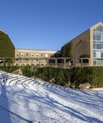Season’s greetings from the dean
It’s time once again to wave goodbye to the old year, and say hello to the new.

I recently had the chance to visit staff at our schools, at CUDiM and in the faculty administration. And I must say it was most enjoyable to meet them all to discuss the events of the past year – and in particular to look ahead at the year to come.
The red thread running through all these meetings was the financial outlook for the future. The Danish universities in general (and the humanities faculties in particular) are facing some pretty major challenges as a result of the government’s degree programme resizing initiative, study progress reform, and cuts in the field of education in general.
However, at AU as a whole and the Faculty of Arts in particular, a combination of due diligence and hard work to improve our financial situation and external research income means that our faculty is well equipped to meet these challenges with long-term, focused initiatives.
Early in the year the faculty took the initiative to analyse our degree programmes, and we are currently preparing the decisions needed to strengthen their financial situation. And the efforts made in recent years are already bearing fruit: the result for 2015 is expected to be extremely positive.
One important aspect of the challenge facing the Danish universities is the study progress reform and its potential financial consequences. I’m convinced that our staff and students know how important it is to reduce the time it takes for students to complete their degrees. The faculty needs to carry out certain measures which will, unfortunately, limit the flexibility currently enjoyed by the students. Naturally, we shall continue to keep the students informed about how to cope with the demands of the study progress reform, as well as ensuring the quality of our degree programmes and student life in general.
One high-priority task in 2016 for the faculty management team and our liaison committees will involve establishing the framework for financial consolidation to compensate for the reduction in degree programme income in the long term. In 2016 we will also continue the task of strengthening the collaboration and organisational links within the faculty, for instance with regard to administrative support and the role of our departments.
Apart from consolidation, the focal points of my meetings across the faculty were quality and internationalisation. In 2016 our quality efforts will be based in particular on the work involved in institutional accreditation. It’s important that we ensure a close link between our degree programmes and our research. We will maintain our high level of ambition with a view to being a national focal point for research and PhD programmes in our field. But we also want to ensure that this level of ambition has a major influence on our degree programmes and student recruitment.
Consolidation and quality will continue to go hand in hand in 2016, and one important aspect of these efforts involves maintaining the international dimension of the faculty’s research and education. This is a vital precondition of quality.
At my meetings across the faculty I was asked a wide range of questions, for instance about the faculty’s research focus areas, potential elite initiatives, internationalisation (for instance with regard to the resizing initiative), competition in relation to university colleges, competence development, MOOCs and the digital humanities. There are plenty of tasks ahead, and in the faculty management team we look forward to the challenges.
Naturally, when I look back at the old year I can’t help but remember all the nice things people said at the reception when I was officially appointed dean in the summer. I still have fond memories of that day – even as the darkness of December descends over Denmark. In particular, I remember the wise words of our joint union representative. He said that the quality and sweetness of a raspberry slice comes from the raspberries, and that the staff who work at our faculty are like the raspberries in this very popular Danish cake. I’m often reminded of those words when I meet staff and students at the Academic Council, the Faculty Liaison Committee, the Faculty Working Environment Committee, and all the other people I meet in the course of an ordinary working day.
So it’s a little sad that almost all the members of the Academic Council, who have been such reliable partners throughout the faculty’s reorganisation process, have come to the end of their term of office. On the other hand, I feel certain that the newly elected Academic Council will take over the reins with the same spirit and energy as their predecessors. I look forward to working with them in 2016.
I must also thank the Academic Council in particular for the conference on 14 December focusing on the identity and strategy of our faculty, launching an important discussion about the faculty’s academic development and future potential. This conference was like a Christmas present, raising an important point which I am sure will retain its relevance in 2016. I hope that the next year will be characterised by precisely this kind of discussion about future development opportunities, but also by a clear sense of justified pride among both staff and students regarding the academic quality of the results we have achieved.
The Times Higher Education recently published a ranking list covering faculties of the humanities. We were number 65 in the world. This is something we can be proud of – in a list that was, incidentally, dominated by English-language universities. It’s just a reminder that while we work to cope with the financial challenges that face us, the faculty continues to achieve great results in terms of research, teaching, communication, research-based consultation, and last but not least internationalisation. We can all be proud of our achievements.
Happy Christmas to you all.
Johnny Laursen

